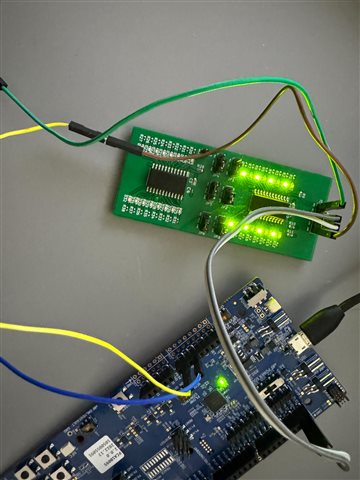Hello!
I'm following the NRF Academy Fundamentals course and I am facing an issue with I2C devices.
I have an STM32 board with HAL code (Non-Zephyr) and I am able to interface the PCF8574 IC successfully.
This sensor board has 10k pull-up resistors attached to SDC and SCL. The pull-up voltage is 5V.
When I tried to run the solution provided for Exercise6-1, I had two Issues:
- Bus fault: I solved it by switching NCS from v2.6.0 to v2.5.3
- I2C error:
[2024-05-09 17:49:25] [00:04:59.580,963] <err> i2c_nrfx_twim: Error 0x0BAE0001 occurred for message 0
[2024-05-09 17:49:25] Failed to write to I2C device address 40 at Reg. aabb, -5
int main(void)
{
int ret;
printk("Booting up I2C app\r\n");
/* STEP 7 - Retrieve the API-specific device structure and make sure that the device is ready to use */
static const struct i2c_dt_spec dev_i2c = I2C_DT_SPEC_GET(I2C_NODE);
if (!device_is_ready(dev_i2c.bus)) {
printk("I2C bus %s is not ready!\n\r",dev_i2c.bus->name);
return -1;
}
uint16_t data = 0xAABB;
while (1) {
ret = i2c_write_dt(&dev_i2c, &data, 2);
if(ret != 0){
printk("Failed to write to I2C device address %x at Reg. %x, %d \r\n", dev_i2c.addr, data, ret);
}
k_msleep(SLEEP_TIME_MS);
}
}
The main code is pretty simple, it checks if the device is ready and sends the data.
STM32 Hal config:
hi2c1.Instance = I2C1;
hi2c1.Init.Timing = 0x60404E72;
hi2c1.Init.OwnAddress1 = 0;
hi2c1.Init.AddressingMode = I2C_ADDRESSINGMODE_7BIT;
hi2c1.Init.DualAddressMode = I2C_DUALADDRESS_DISABLE;
hi2c1.Init.OwnAddress2 = 0;
hi2c1.Init.OwnAddress2Masks = I2C_OA2_NOMASK;
hi2c1.Init.GeneralCallMode = I2C_GENERALCALL_DISABLE;
hi2c1.Init.NoStretchMode = I2C_NOSTRETCH_DISABLE;
GPIO_InitStruct.Pin = GPIO_PIN_6|GPIO_PIN_7;
GPIO_InitStruct.Mode = GPIO_MODE_AF_OD;
GPIO_InitStruct.Pull = GPIO_PULLUP;
GPIO_InitStruct.Speed = GPIO_SPEED_FREQ_LOW;
GPIO_InitStruct.Alternate = GPIO_AF4_I2C1;
HAL_GPIO_Init(GPIOB, &GPIO_InitStruct);
I tried to set pull-up config in the device tree, and the results are the same. The I2C device address is 0x40.
Not sure what could be going wrong. Can someone please look into it?



